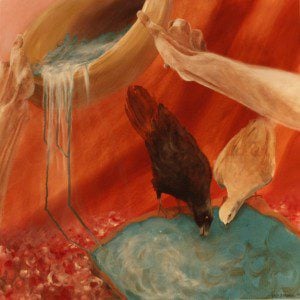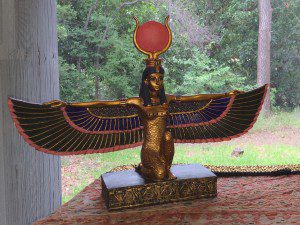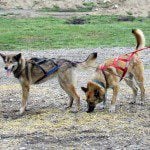 The response to the Portrait of Danu was overwhelmingly positive, even if the volume wasn’t what it is when I write on controversial topics. Friends and other commenters thought the painting was beautiful – I obviously agree.
The response to the Portrait of Danu was overwhelmingly positive, even if the volume wasn’t what it is when I write on controversial topics. Friends and other commenters thought the painting was beautiful – I obviously agree.
But in a private comment, a very knowledgeable Pagan friend (who wishes to remain anonymous) said:
Thanks for the post on Danu today. it’s nice to see advocacy of devotion to a Mother Goddess from a polytheist perspective. Sometimes it seems like the nurturing Goddesses and Gods are largely ignored in polytheist-identified circles.
I hadn’t thought about that, but my friend is right. A quick, informal survey of devotional polytheist blogs, books, and social media conversations shows a focus on deities of sovereignty, of transformation, of inspiration, of crafts, and of battle. Mother Goddesses and other nurturing deities? It wouldn’t be accurate to say They’re absent, but They’re certainly in the minority.
Why is that, and what does it mean?
Aggressive Gods are more aggressive. If we accept the basic polytheistic concept that Gods are independent beings with goals, desires, and personalities of Their own, then it stands to reason that Gods with more aggressive personalities would be more active in calling priests and other devotees. Nurturing deities are worshipped less because They’ve called fewer worshippers.
Until someone figures out a way to survey Olympus and its many equivalents in other pantheons we have no way of knowing whether this is true or not, but it’s a reasonable projection.
 There aren’t that many nurturing deities. I’m reminded of the meme I see going around Facebook with some regularity: “Jesus loves you – Odin wants you to grow up.” Read the stories of the Old Gods – how many Great Mothers and Devoted Fathers do you see? There’s Isis, for sure. And probably Demeter. I see Danu as a nurturing Mother Goddess, but there are no stories of Her, so it’s hard to say.
There aren’t that many nurturing deities. I’m reminded of the meme I see going around Facebook with some regularity: “Jesus loves you – Odin wants you to grow up.” Read the stories of the Old Gods – how many Great Mothers and Devoted Fathers do you see? There’s Isis, for sure. And probably Demeter. I see Danu as a nurturing Mother Goddess, but there are no stories of Her, so it’s hard to say.
The ancient world was a much more harsh place than the 21st century West. Perhaps our ancestors needed more nurturing deities, but what they wanted was victory over enemies, good hunts and harvests, wisdom, love, and a successful family to continue their names after they were gone. Nurturing adults wasn’t high on their list of priorities and that’s reflected in the Gods they worshipped.
The Gods are complex beings. We tend to put Gods into nice little boxes that explain who They are and what They do in just a few words. But how well can you be described in just a few words? How much more complex are Gods who are older, wiser, and more powerful than humans?
While there aren’t a lot of purely nurturing deities, many deities can be a loving mentor or caregiver… at least when They see fit to do so. Cernunnos is a Wild God who has shown me what it means to be strong and free, but I have experienced Him as a nurturing God as well. When I think of His role (one of His roles, not His complete identity) as God of the Forest and Lord of the Animals I can’t imagine how He could not be a nurturing God. If you love these places and the creatures who live in them, you want to nurture and protect them.
Some people take this too far. I’ve seen a Facebook group recently that worships Morrigan as a nurturing Mother Goddess. Morrigan is a very complex deity, but nothing I’ve read or experienced has given me any indication nurturing is part of who She is… unless you consider guiding souls of the dead to the Otherworld to be nurturing.
Those who seek nurturing Goddesses and Gods may never make it to devotional polytheism. I want to be careful not to imply that devotional polytheism is at the top of some hierarchy of theological models or that monotheism to duotheism to soft polytheism to hard polytheism is a natural progression from less-right to more-right. That was my experience, though, and given how entrenched monotheism is in our wider culture I think it’s a common experience.
Those who most value nurturing may find what they’re looking for in the Triple Goddess of Wicca or in a generic Great Mother. That many devotional polytheists find that view inadequate isn’t the point – the point is that many people who would “advocate devotion to a Mother Goddess from a polytheist perspective” simply never become polytheists.
Some of us desire aggressive Gods. I’m reluctant to expand on this because I haven’t given it much thought in my own life. Cernunnos has always been near me. Danu presented Herself to me at a time when I needed Her connection to Life. I approached Morrigan because I needed Her assistance – She later approached me to pay my debts. I understand the concept of of approaching a warrior deity because you have battles to fight and you want the strength of Herakles or the wisdom of Athena. But my friend’s comment implies some of us simply desire to have aggressive Gods in our lives, and I see how that conclusion could be reached.
And yet…
The Anomalous Thracian is a priest of Sabazios, who is described as:
a Solar-Chthonic nomadic Thracian mountain warrior horseman god of ecstasy, oracle and nocturnal thunderstorms, associated with all manner of mystical, totemic, and esoteric symbols, tools, and practices. Among His most prominent associations is the serpent, a spear or thyrsus-staff and His primary sacrificial animal, which seems to shift geo-culturally between the horned ram and the bull.
In other words, not a nurturing God.
This past Summer Solstice witnessed the 28 Miracles of Sabazios – 28 Argentine Boa Constrictors born from a Temple serpent who should not have been pregnant, but obviously was. They are considered the children of Sabazios and are treated “with the respect befitting living, incarnated divinities.”
That’s the religious side. The practical side is that there are now 28 new baby snakes that have to be cared for. Boas are among the snakes that give birth to live young, but they do not feed their young like mammals and birds.
While I’m no ophiophobe, I am not particularly fond of snakes. But I have greatly enjoyed the Anomalous Thracian’s on-going accounts of caring for the 28 Miracles: monitoring their progress, feeding them at appropriate times and taking extreme measures to provide for one young snake who didn’t care for the standard offerings. Building habitats, and figuring out the most ethical and most economical way to feed all these snakes. Keeping meticulous records for both practical and sacred purposes.
In other words, nurturing. Sabazios may not be a nurturer, but He has inspired nurturing in His priest.
So what does all this mean? Honestly, I’m not sure, even though I find this sort of theological speculation incredibly fascinating. I do think Mother Goddesses are underrepresented in devotional polytheism. It’s worthwhile to ask ourselves if They’re underrepresented in our lives, and if so, whether we might be better served by adding Someone to our regular devotions.
But I’m sure of one thing: what matters is that we honor the Gods who call to us, no matter who – and what – They are.
















